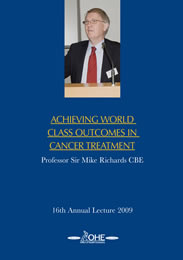Sign up to our newsletter Subscribe
Achieving World Class Outcomes in Cancer Treatment

Sign up to our newsletter Subscribe
This paper is derived from the proceedings of an Office of Health Economics Study Day, held at the Royal College of Obstetricians and Gynaecology on 11 September 1980.
OHE is grateful to all those taking part. Particular thanks are due to Professor Sir John Butterfield who acted as Chairman for the day and to Professor Arthur Buller, Sir Alexander Merrison, Professor Sir John Brotherston, Professor Alan Williams, Professor Margaret Stacey, Steven Cang and Robert Maxwell, all of whom addressed the meeting. Because of OHE’S particular interest in health economics research Professor William’s paper is included as an appendix to this publication. During the preparation of this paper effort has been made to confirm the accuracy of the information it presents about the evolution of health-related research in England. However, in dealing with interactions influenced by the personal relationships between key individuals and in some areas, rightly or wrongly, coming under the rules relating to Civil Service confidentiality complete certainty as to the course of events is impossible to achieve. Also difficult, and in certain cases ultimately subjective, judgements have had to be made in, for instance, attempting to balance the criticisms made of academic research on the one hand (which may sometimes imply questioning at a personal level) and comments relating to large, relatively impersonal bodies like the MRC and the DHSS on the other.
An error has occurred, please try again later.
This website uses cookies so that we can provide you with the best user experience possible. Cookie information is stored in your browser and performs functions such as recognising you when you return to our website and helping our team to understand which sections of the website you find most interesting and useful.
Strictly Necessary Cookie should be enabled at all times so that we can save your preferences for cookie settings.
If you disable this cookie, we will not be able to save your preferences. This means that every time you visit this website you will need to enable or disable cookies again.
This website uses Google Analytics to collect anonymous information such as the number of visitors to the site, and the most popular pages.
Keeping this cookie enabled helps us to improve our website.
Please enable Strictly Necessary Cookies first so that we can save your preferences!